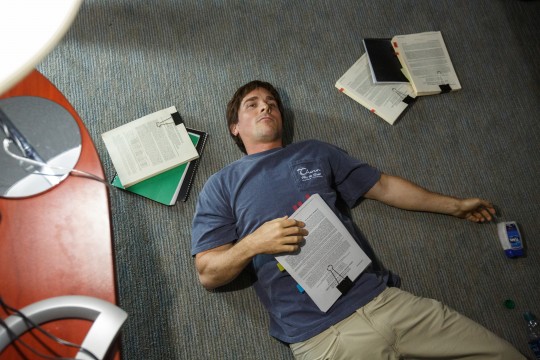
By Robert Reich –
If you haven’t yet seen “The Big Short” – directed and co-written by Adam McKay, based on the non-fiction prize-winning book by Michael Lewis about the housing and credit bubble that triggered the Great Recession — I recommend you do so.
Not only is the movie an enjoyable (if that’s the right word) way to understand how the big banks screwed millions of Americans out of their homes, savings, and jobs – and then got bailed out by taxpayers. It’s also a lesson in why they’re on the way to doing all this again – and how their political power continues to erode laws designed to prevent another crisis and to shield their executives from any accountability.
Most importantly, the movie shows why Bernie Sanders’s plan to break up the biggest banks and reinstate the Glass-Steagall Act (separating investment from commercial banking) is necessary – and why Hillary Clinton’s more modest plan is inadequate.
I’ll get back to Bernie and Hillary in a moment, but first you need to know why Wall Street wants us to forget what really happened.
The movie gets the story essentially right: Traders on the Street pushed highly-risky mortgage loans, bundled them together into investments that hid the risks, got the major credit-rating agencies to give the bundles Triple-A ratings, and then sold them to unwary investors. It was a fraudulent Ponzi scheme that had to end badly – and it did.
Yet since then, Wall Street and its hired guns (including most current Republican candidates for president) have tried to rewrite this history.
They want us to believe the banks and investment houses were innocent victims of misguided government policies that gave mortgages to poor people who shouldn’t have got them.
That’s pure baloney. The boom in subprime mortgages was concentrated in the private market, not in government. Wall Street itself created the risky mortgage market. It sliced and diced junk mortgages into bundles that hid how bad they were. And it invented the derivatives and CDOs that financed them
The fact is, more than 84 percent of the subprime mortgages in 2006 were issued by private institutions, and nearly 83 percent of the subprime loans that went to low- and moderate-income borrowers that year.
Why has Wall Street been pushing its lie, blaming the government for what happened? And why has the Street (along with its right-wing apologists, and its outlets such as Rupert Murdoch’s Wall Street Journal) so viciously attacked the movie “The Big Short?”
So we won’t demand tougher laws to prevent another crisis followed by another “too-big-to-fail” bailout.
Which brings us back to Bernie and Hillary. Hillary Clinton doesn’t want to break up the big banks or resurrect the Glass-Steagall Act, as Bernie does
Instead, she’d charge the big banks a bit more for carrying lots of debt and to oversee them more carefully. She’d also give bank regulators more power to break up any particular bank that they consider too risky. And she wants more oversight of so-called “shadow banks” such as hedge funds and insurance companies like the infamous AIG.
In a world where the giant Wall Street banks didn’t have huge political power, these measures might be enough. But, if you hadn’t noticed, Wall Street wields extraordinary power.
Which helps explain why no Wall Street executive has been indicted for the fraudulent behavior that led up to the 2008 crash. Or for the criminal price-fixing scheme settled last May. And why even the fines imposed on the banks have been only a fraction of the banks’ gains.
And also why Dodd-Frank is being watered down into vapidity. For example, the law requires major banks to prepare “living wills” describing how they’d unwind their operations if they get into serious trouble. But no big bank has come up with one that passes muster. Federal investigators have found them all “unrealistic.”
Most of Hillary’s proposals could already have been put into effect by the Fed and the Securities and Exchange Commission, but they haven’t been – presumably because of the Street’s muscle.
As a practical matter, then, her proposals are invitations to more dilution and finagle.
The only way to contain the Street’s excesses is by taking on its economic and political power directly – with reforms so big, bold, and public they can’t be watered down. Starting with busting up the biggest banks, as Bernie Sanders proposes.
More than a century ago, Teddy Roosevelt broke up the Standard Oil Trust because it posed a danger to the U.S. economy. Today, Wall Street’s biggest banks pose an even greater danger. They’re far larger than they were before the crash of 2008.
Unless they’re broken up and Glass-Steagall resurrected, we face substantial risk of another near-meltdown – once again threatening the incomes, jobs, savings, and homes of millions of Americans.
To paraphrase philosopher George Santayana, those who cannot remember they were screwed by Wall Street are condemned to be screwed again.
Robert Reich is Chancellor’s Professor of Public Policy at the University of California at Berkeley and Senior Fellow at the Blum Center for Developing Economies. He was Secretary of Labor in the Clinton administration. Republished here under a Creative Commons License from RobertReich.org.














